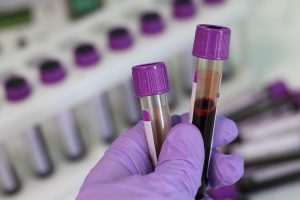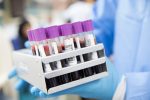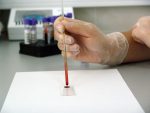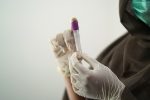
Even though it is not a long journey, becoming a phlebotomist still requires a certain amount of time devoted to a short training program.
Upon finishing it, the main problem arises, as you cannot get hired as a phlebotomist without experience.
This is an important medical field and medical facilities would rather hire experienced phlebotomists.
Now, you are certainly wondering how to gain experience without a job.
Well, the firth thing that comes into one’s mind is to build up your resume by volunteering.
You can become a volunteer in hospitals and clinics that are always willing to hire a phlebotomy graduate.
Page Navigation
- Is it Easy to Get a Phlebotomist Job?
- What Experience Will I Gain from Phlebotomy Training?
- How to Apply for a Phlebotomy Job
- Entry Level Phlebotomy Jobs Near Me
- Where Can I Find a Job as a Phlebotomist?
- Recruitment as a Phlebotomist during Training
- Phlebotomy Internships
- On-the-Job Training
- Volunteer as a Phlebotomist
- Temporary Work at a Medical Staffing Agency
- Plasma Donation Centers
- Become a Certified Phlebotomist
- Other Training Courses
- Transfer Careers from another Medical Job
- Transfer from Phlebotomy to a Different Medical Career
- How to Get a Raise as a Phlebotomist
- What If I Can’t Find a Trainee Phlebotomy Job?
Is it Easy to Get a Phlebotomist Job?
We keep on emphasizing that there is a shortage of phlebotomists in the United States.
The majority of medical facilities are constantly looking for qualified phlebotomy technicians.
However, recruiters hire people who have taken the time to learn what the job involves and have years of experience.
So, besides the huge demand, it is not easy to get a phlebotomy job right after finishing the training.
Medical facilities have the opportunity to choose from an abundance of potential trainees so it is up to you to show that you can offer more than just an academic qualification and to stand out from other candidates.
But, once you get hired, you will be provided on-the-job phlebotomy training and learn an abundance of new skills and strengths.
So, it is worth every effort at the beginning.
What Experience Will I Gain from Phlebotomy Training?
Some people wonder why they should take a phlebotomy training course if they are required to take the extra experience to get hired.
They find it frustrating to go through training and not be able to land a job right away.
The training should not be considered useless, as it provides you with a vast amount of information.
All the knowledge and experience that you gain on a phlebotomy course are essential for you as a future phlebotomist.
It provides you with the basics necessary for your entire career as a phlebotomy technician.
Most training programs consist of two sections:
- The first half – traditional classroom-style learning
- The second half – hands-on work, such as performing venipunctures.
Phlebotomy training is designed to teach you medical terminology and different systems of the body, as well as proper venipuncture techniques and how to label blood samples.
However, there are other things you can do after training, so it is necessary to gain on-the-job experience as well.
How to Apply for a Phlebotomy Job
The first thing a person eager to get a good phlebotomy job should do is to create a solid resume.
It can be challenging as he/she might not have any previous jobs to list and no experience in the phlebotomy field.
However, he/she can still mention all the skills and education to enhance your resume.
A good resume should be clean and concise, so do not write a lot about yourself.
Shorter resumes are more likely to be read and considered.
You must have a clear objective statement and you can list where you received your education and any extra certifications that you may have.
Of course, those who have worked or have any professional experience should mention it and it can be beneficial.
Those who do not have it should speak about their skills and personal characteristics that will match the specific job and will be valuable for the future career.
Some of the qualifications and characteristics that a phlebotomist needs are the following:
- Patience
- An even temper
- Kindness
- Good bedside manner
- Stamina
- Good hand-eye coordination
- Strong customer service skills
You can also list your phlebotomy achievements and skills and mention that you were exceptional at using a butterfly syringe during your training or that you successfully completed 100 venipunctures.
The most important thing when applying for phlebotomy jobs is to read carefully the job postings and mention in your resume the qualities you have that fit the specific job.
If you come across a job posting that states that the facility is looking for someone with experience, you will not be considered a good fit and you should not waste your time applying.
Our suggestion is to visit the websites of local hospitals and clinics and see whether they have current job openings.
Furthermore, if there is no job opening related to phlebotomy, you can still apply as there is a chance that they keep your application/resume on file, and once the opportunity for hiring arises, you will be at the top of the resume list.
Another option is going to medical facilities in person, ask what kind of jobs they have to offer, and leave your resume in the process.
Face-to-face interaction can be beneficial, and the recruiters may be more likely to remember you when a phlebotomy job becomes available.
Entry Level Phlebotomy Jobs Near Me
If you wish to find a phlebotomy job near you, you can do research on online job boards.
Maybe there is a facility in your area that is hiring, being that phlebotomists are needed all over the country.
People who are planning on moving can also look somewhere across the country.
A great suggestion is using Google Alerts or setting up notifications for phlebotomy job postings.
Once a new job is posted, you will be notified right away and you can be the first to apply for it.
Where Can I Find a Job as a Phlebotomist?
Future phlebotomists must know that hospitals are not the only places where a phlebotomy technician can find employment.
Phlebotomists can work in many places, so it is important not to limit yourself to specific employers.
Some of the other options include:
- Emergency clinics: What makes them different from hospitals is that they are both open 24/7, but people go to emergency clinics voluntarily. Emergency clinics are for those that have a severe medical problem but do not require an ambulance.
- Private practices: These are small doctor’s offices that need a phlebotomist. Sometimes they do not offer a full-time position, but even this kind of employment will be ideal for you to gain experience. Plus, this is a calmer working environment.
Opportunities are various but not all of these employers will pay as well as a full-time phlebotomy job in a hospital or a clinic.
Some may not even pay at all, but they are still considered excellent places to start, as they can help you gain experience.
Recruitment as a Phlebotomist during Training
Whether you can be recruited as a phlebotomist during training will highly depend on the place you take your training program.
Some educational facilities make connections with people from an area hospital or clinic who come there to recruit phlebotomists who will soon graduate.
These recruiters might not be considered significant for people who are just starting out in their training course, but they can be quite helpful to those graduating from your program.
These recruiters can help them land a job sooner even without any prior experience as a phlebotomist.
Only those medical facilities that are in great need of phlebotomists send recruiters to training courses and they choose which educational institution they will get graduates from.
Phlebotomy Internships
If you are ready to improve your chances of getting hired, you should consider getting an internship.
Hospitals are places that offer internships to phlebotomists who have completed their training.
You need to know that in the majority of cases internships are not paid, but this position can be beneficial as it helps you gain the experience needed for finding a real job.
During your internship, you will be working with a phlebotomist whose job will be to supervise what you do.
You will be supposed to assist them in their daily tasks.
The main reason why facilities hire interns is to train them to work well in that specific environment, as each hospital has its own rules and regulations.
This means that interns will both gain phlebotomy experience and learn the safety procedures of that facility.
Once they get familiar with the staff and the layout and learn the expectations of that hospital, the chances of being hired by that facility are greater.
After getting employment, your job will be much easier as you will already be feeling comfortable in your surroundings and with the people you already know.
On-the-Job Training
It is worth mentioning that on-the-job training and internships are two different things.
Even though these two terms are sometimes confused, we need to inform you about things that make them distinctive.
Let’s start with similarities.
They both require that a person takes a phlebotomy training course on his/her own.
You cannot be hired or offered an internship if you have not finished a phlebotomy training program.
The main difference comes after getting the proper training.
In some facilities, you will be offered on-the-job training, which is extra training provided by the facility itself.
The facility will require taking extra training due to the fact that a training course provides only the basic knowledge about phlebotomy, but very little hands-on interaction.
Hospitals consider phlebotomy procedures significant, so they give phlebotomy graduates on-the-job training, thus enabling them to work more directly with patients.
During this training, you will be working under the supervision of a phlebotomist on staff just as with an internship.
Supervision may last a few months, but trainees in some hospitals were under supervision for up to two years.
What makes on-the-job training different from an internship is that a trainee gets paid for what he//she does during the training period.
You should not expect a great salary, as phlebotomists on staff get, but this a great way to get hired and gain experience, thus reach a decent salary after the training is done.
Volunteer as a Phlebotomist
Even though not many of you will consider it a good option, we believe that people who are having trouble getting a job without experience should definitely volunteer.
Phlebotomists are in high demand in busy hospitals, but this is not the only place where you can offer your services.
Many other organizations are in need of qualified phlebotomists, usually, non-profit groups or facilities that cannot afford to hire a full-time phlebotomist and that will really need your services.
These are the groups that really rely on volunteers but unfortunately cannot offer payment.
Volunteering is an excellent way to boost your resume and gain experience, plus volunteering mentioned as your phlebotomy skill in your resume will look great to an employer.
The primary benefits of volunteering are that recent graduates start practicing drawing blood and cooperating with real patients, not colleagues and mannequins.
These are the skills that cannot be taught in a classroom, such as talking to patients, calming them down, and even handling difficult ones.
These skills can be advanced only when you are face-to-face with someone.
You will get the experience you need through volunteering, as you will have a chance to work with a variety of different people so as to better prepare to work with different types of patients.
Phlebotomy volunteer opportunities can be found near you at the following places:
- Nursing homes
- Veterans’ hospitals
- Local blood banks
- American Red Cross
- Prisons
- Drug treatment centers
Temporary Work at a Medical Staffing Agency
Even though it is just temporary work, you can find employment in some medical staffing agencies.
They not only hire phlebotomists but are also willing to provide him/her with on-the-job training.
Those who apply for a temporary job need to make sure their resume includes several references that the agency can contact and ask for their skills.
Unfortunately, you cannot expect to work all your life as this is not full-time work.
Still, it is an ideal opportunity to gain quality experience matched with temporary employment.
Plasma Donation Centers
Phlebotomists do not only work in blood banks throughout the United States.
The need for them exists in plasma donation centers as well.
Many people donate plasma, and some donation centers offer their donors money, making it a popular procedure.
Plasma donation centers are places where phlebotomy graduates can find employment even though they do not have much experience.
Their job is to draw blood from their patients, and then separate the blood from the plasma.
Once this is done, the blood is put back in.
At a plasma donation center, novice phlebotomists can reach great experience.
Become a Certified Phlebotomist
Finishing phlebotomy training does not mean that you cannot advance even more.
The best thing a new phlebotomy graduate can do to make his/her phlebotomy resume look even better is to get certified.
You probably already know that phlebotomy certification is not required by every state, but it is our suggestion to get it.
Once you get a certification, you will definitely have a better chance of getting hired by a medical facility.
Plus, a higher salary will be offered to you than to those who do not possess certification.
What is even better is that getting certified as a phlebotomist is not at all difficult.
You will just need to take a few extra weeks of training, so as to be able to take a phlebotomy certification exam.
Again, we consider it worth mentioning that certification without experience may not be enough to be hired by a medical facility.
However, you will be considered a more appropriate candidate and this is definitely the first step you should take in gaining more experience as a phlebotomist.
Other Training Courses
You can decide to finish other training courses, which will not give you more phlebotomy experience but equip you with other medical skills.
A perfect example is a CPR course, especially if you want a job at a hospital.
Becoming CPR-certified can be a part of your on-the-job training.
However, those who have already finished this course should include it in their resume to make it look great.
We need to mention that CPR training from the American Red Cross can be attended for free.
You should not take it as something disappointing if you have trouble finding a job right away.
Quite contrary, you should use this situation to keep improving yourself by taking training courses.
Any additional training will help you to boost your resume and you will get a chance to become hired for an internship or on-the-job training.
Furthermore, the more skillful you are, the higher salary you can expect and even ask for.
Transfer Careers from another Medical Job
It is not at all unusual for individuals who already work in the healthcare industry to make a switch.
This means that due to the fact they already had a healthcare job, they will be getting hired sooner and easier as a phlebotomist.
As they have been working in a hospital, they know the safety rules and how the facility functions.
So, they can skip the orientation or on-the-job training process.
We need to note that even though you have a medical job, you still need to complete a phlebotomy training program before you can get hired as a phlebotomist.
Phlebotomy is a specific job, and even a doctor or nurse will be required to take a phlebotomy training course so as to be qualified to do it.
Your main advantage will be that you may be able to transfer jobs faster if you already work in medicine.
Many people in the medical field want to advance their education and skills, so they try reaching the phlebotomy field which is currently experiencing a lot of growth and need.
Transfer from Phlebotomy to a Different Medical Career
It is worth mentioning that phlebotomy training takes less than a year, which is quite short for any medical field, but on the other hand, it requires a lot more work and experience to get a job as a phlebotomist.
We would like to tell you two ways you can choose to take after you gain employment and become a full-time phlebotomist:
- One way is to build a life-long career in phlebotomy. Even though this is considered an entry-level job, it does not mean that you cannot build a successful career as a phlebotomy technician. You can work either in a hospital or private practice and even change places depending on your interests and necessities as the need for phlebotomists is great. Plus, the demand is probably going to grow as new technologies enable us to determine more health conditions from blood samples.
- The other way is to only use phlebotomy as a springboard into other medical careers. Those who have an interest in healthcare, but cannot afford expensive medical programs often choose a year of phlebotomy training and another year or two of on-the-job training to become phlebotomists and enter the medical field. This is only the first step on their way up, being that they decide to continue education to get to a higher level.
How to Get a Raise as a Phlebotomist
As we have already mentioned, your career can advance if you move to a different medical position.
However, you can grow your career as a phlebotomist, either once you get more experience.
After gaining enough experience as a phlebotomist, there is a chance of moving into a supervisory position.
The supervisor’s job is to be in charge of other phlebotomists in a hospital or clinic, which is followed by a pay raise.
You can also choose some more specialized areas of phlebotomy, such as therapeutic phlebotomy.
therapeutic phlebotomy is a procedure prescribed by a doctor and this is a treatment for different medical conditions.
One such condition is too much iron in the blood.
So as to become a therapeutic phlebotomist, you will need to take extra schooling, but you can expect to earn more money after finishing the training.
The easiest way to make more money as a phlebotomist is to work more hours.
This can be done after you do get a phlebotomy job.
Phlebotomists’ average salary $32,000 per year, but you can always choose various ways we mentioned to increase your salary.
The more experience you have, the higher salary you may expect.
Experience is essential and you are highly suggested to take every opportunity you can find to gain experience.
What If I Can’t Find a Trainee Phlebotomy Job?
Those who cannot find a phlebotomy job should not get frustrated or disappointed.
Even though there is a great demand for qualified phlebotomists, medical facilities avoid hiring phlebotomists without experience.
What you can do is follow the tips in this guide to gain experience.
Do not get confused if the facility re-trains you even though you have already finished the training.
They will do that so as to make sure you are doing things the way they want.
Building up your experience is the way to find a phlebotomy job faster.








